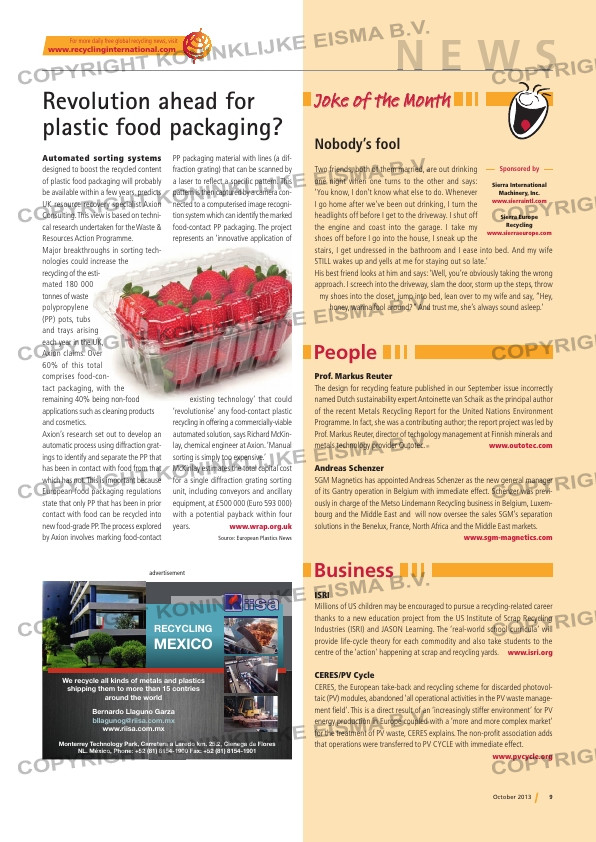Page 9 from: October 2013

N E W S
9October 2013
For more daily free global recycling news, visit
www.recyclinginternational.com
People
Joke of the Month
Business
Prof. Markus Reuter
The design for recycling feature published in our September issue incorrectly
named Dutch sustainability expert Antoinette van Schaik as the principal author
of the recent Metals Recycling Report for the United Nations Environment
Programme. In fact, she was a contributing author; the report project was led by
Prof. Markus Reuter, director of technology management at Finnish minerals and
metals technology provider Outotec. www.outotec.com
Andreas Schenzer
SGM Magnetics has appointed Andreas Schenzer as the new general manager
of its Gantry operation in Belgium with immediate effect. Schenzer was previ-
ously in charge of the Metso Lindemann Recycling business in Belgium, Luxem-
bourg and the Middle East and will now oversee the sales SGM’s separation
solutions in the Benelux, France, North Africa and the Middle East markets.
www.sgm-magnetics.com
Nobody’s fool
Two friends, both of them married, are out drinking
one night when one turns to the other and says:
‘You know, I don’t know what else to do. Whenever
I go home after we’ve been out drinking, I turn the
headlights off before I get to the driveway. I shut off
the engine and coast into the garage. I take my
shoes off before I go into the house, I sneak up the
stairs, I get undressed in the bathroom and I ease into bed. And my wife
STILL wakes up and yells at me for staying out so late.’
His best friend looks at him and says: ‘Well, you’re obviously taking the wrong
approach. I screech into the driveway, slam the door, storm up the steps, throw
my shoes into the closet, jump into bed, lean over to my wife and say, “Hey,
honey, wanna fool around?” And trust me, she’s always sound asleep.’
Sponsored by
Sierra International
Machinery, Inc.
www.sierraintl.com
Sierra Europe
Recycling
www.sierraeurope.com
ISRI
Millions of US children may be encouraged to pursue a recycling-related career
thanks to a new education project from the US Institute of Scrap Recycling
Industries (ISRI) and JASON Learning. The ‘real-world school curricula’ will
provide life-cycle theory for each commodity and also take students to the
centre of the ‘action’ happening at scrap and recycling yards. www.isri.org
CERES/PV Cycle
CERES, the European take-back and recycling scheme for discarded photovol-
taic (PV) modules, abandoned ‘all operational activities in the PV waste manage-
ment fi eld’. This is a direct result of an ‘increasingly stiffer environment’ for PV
energy production in Europe coupled with a ‘more and more complex market’
for the treatment of PV waste, CERES explains. The non-profi t association adds
that operations were transferred to PV CYCLE with immediate effect.
www.pvcycle.org
advertisement
Automated sorting systems
designed to boost the recycled content
of plastic food packaging will probably
be available within a few years, predicts
UK resource recovery specialist Axion
Consulting. This view is based on techni-
cal research undertaken for the Waste &
Resources Action Programme.
Major breakthroughs in sorting tech-
nologies could increase the
recycling of the esti-
mated 180 000
tonnes of waste
polypropylene
(PP) pots, tubs
and trays arising
each year in the UK,
Axion claims. Over
60% of this total
comprises food-con-
tact packaging, with the
remaining 40% being non-food
applications such as cleaning products
and cosmetics.
Axion’s research set out to develop an
automatic process using diffraction grat-
ings to identify and separate the PP that
has been in contact with food from that
which has not. This is important because
European food packaging regulations
state that only PP that has been in prior
contact with food can be recycled into
new food-grade PP. The process explored
by Axion involves marking food-contact
Revolution ahead for
plastic food packaging?
PP packaging material with lines (a dif-
fraction grating) that can be scanned by
a laser to refl ect a specifi c pattern. This
pattern is then captured by a camera con-
nected to a computerised image recogni-
tion system which can identify the marked
food-contact PP packaging. The project
represents an ‘innovative application of
existing technology’ that could
‘revolutionise’ any food-contact plastic
recycling in offering a commercially-viable
automated solution, says Richard McKin-
lay, chemical engineer at Axion. ‘Manual
sorting is simply too expensive.’
McKinlay estimates the total capital cost
for a single diffraction grating sorting
unit, including conveyors and ancillary
equipment, at £500 000 (Euro 593 000)
with a potential payback within four
years. www.wrap.org.uk
Source: European Plastics News
We recycle all kinds of metals and plastics
shipping them to more than 15 contries
around the world
Bernardo Llaguno Garza
[email protected]
www.riisa.com.mx
Monterrey Technology Park, Carretera a Laredo km. 25.2, Cienega de Flores
NL. México, Phone: +52 (81) 8154-1900 Fax: +52 (81) 8154-1901
RECYCLING
MEXICO
p00_NEWS.indd 9 03-10-13 10:23



